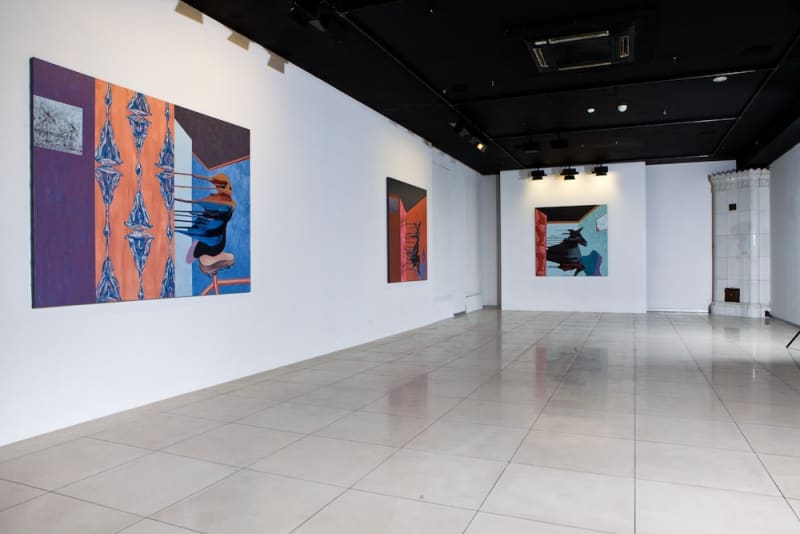The new project by Ivan Plusch is dedicated to the issue of immortality of body and soul. The moving bodies are executed in a manner of "leaking painting", typical of the artist. They long for permanency, are willing to become eternal mechanisms with easily exchangeable details. The invisible souls demand intermission and rest. Being inexorably associated with the bodies, they are trying to make aware of themselves, to detach the plastic matter of the bodies from the spatial conditions they happened to exist. However the solid material bodies are endlessly pulling the souls through time. They are less durable than souls and therefore long for self-destruction. As there is no strength in body without strength in soul.
The artist constructs a transparent but at the same time scrappy narrative about constancy and irregularity of this deformation in the gallery. His peculiar pseudo-corporeal images are coming from behind the corners of ordinary rooms, appearing in the lining between the angular passages, illustrated by being enframed as ‘paintings in paintings’. It seems that these are just shadows of the characters, casts of the souls, misty echoes of vague individuals who used to be high-grade personalities. Or on the contrary, we are facing some macabre nymphosis of the future souls, directed only at the sphere of life and they are just about to get out of their multi-angular small cardboard rooms with twee wallpapers which speak of the feeling of external simplicity of life and modest comfort. ‘The paintings in paintings’ seem to promise a clue, but require further examination. And this is why the answer eludes us.
In a short film by Peter Greenaway ‘Inside Rooms: 26 Bathrooms, London & Oxfordshire’ the homeliness of the characters shot in their own bathrooms tells about the most secret place, here they can be alone with themselves and their relatives, can take off their masks and regain the harmony of soul and body. The inner rooms in the new series of works by Plusch are anti- bourgeois, transitional and hopeless. Even here, in suppressed corners of their habitations his characters can’t finв sanctuary can’t stop the whirling feeling. The external space intrudes on them at a weak moment in their hovels, looking at them from behind of every corner, pressing out of the wallpapers’ print, reminding them of its presence from the ugly hanging picture. Reproduction technology guarantees them immortal bodies, but what follows after it are clichés of cheerless souls’
Dmitriy Ozerkov
